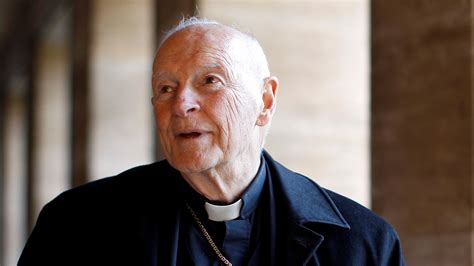“What do I do now?” is what every Catholic thinks as we awaken to further detail of the ignoble ascendancy of Theodore McCarrick in the U.S. Episcopacy. The bishops who placed authority in McCarrick — whether knowing of allegations against him or not — in 2002 to lead them through the dark aftermath of the Boston Globe exposé offer only silence or largely predictable, repetitive. and weak answers.
The Laity must ask questions. The Laity must demand answers. The Laity must find their own path forward.
I propose for the following for immediate action: that the laity in every diocese of the United States requests their bishop appoint a lay commission charged with the immediate duty of investigating and reporting to the diocesan community information regarding their bishop’s knowledge of formerly-Cardinal McCarrick’s malfeasance.
This proposal supplements my call for an internal audit at the USCCB and appointment of a national lay commission in my Open Letter to the USCCB Regarding the Cardinal McCarrick Scandal, and provides an immediate action which bishops and laity can undertake cooperatively and incorporates the Church’s tradition and value of subsidiarity in all ecclesiastical matters.
With two exceptions, the Episcopal statements which have issued thus far follow a similar pattern: disclaimer of knowledge, general sorrow, prayer, more sorrow especially for those harassed or abused, vague assurances that the right people are addressing matters and, finally, a call to wait. As Cardinal Wuerl phrased his statement, “We must now wait for a final determination of this case to be made in Rome.” Victims are urged to come forward because, again from Washington, DC, “the archdiocese wishes to accompany them and help them through this process.”
Even the USCCB’s statement on August 1, 2018 – a full sixteen days since the New York Time’s bombshell headline “He Preyed on Men Who Wanted to Be Priests. Then He Became a Cardinal” – offered no role for its beleaguered, beaten laity, nothing for the laity to do – except pray and hope that their bishops are “learning from past sins” as they gather in closed meetings and undertake secret communications and processes which, we should be assured, will address their last decades of moral failure.
Given what I have seen of the USCCB’s performance in addressing, much less handling, matters of their own personal accountability, along with the secretive management style of abuse claims by members like Cardinal Wuerl’s in his Pittsburgh assignment — where a Grand Jury report on clerical abuse is pending disclosure — I can place no confidence in the USCCB or its members like Cardinal Wuerl.
I understand if victims read the USCCB’s statement and those like Cardinal Wuerl’s statement and weep. I understand if laity feels distraught, alienated and even consider leaving this scandal-ridden church. Neither the USCCB nor fellow bishops can be relied upon to correct or disagree with any bishops public assertions or practical strategy.
The emotional climate among the laity ranges from grief to anger – but a sense of powerlessness, betrayal, and Episcopal paralysis prevails. I have personally shared the suffering and pain of my fellow laity in the hundreds of comments, emails and inquiries I have received since my Open Letter to the United States Conference of Bishops Regarding the Cardinal McCarrick Scandal.
Particularly acute is the suffering of the women of the Church who, often with great sacrifice by spouses and families, invested time, talent, and resources in support of the USCCB’s 2002 promises that healing, recovery, and spiritual renewal would be achieved and that abusive clerical behavior toward our children and young people would not be tolerated.
Upon these promises, we Catholic women especially continued raising our children in the Church, interacting with trust with both priests and bishops sent to our parishes and dioceses, and, critically, encouraging our sons to consider seminary and a priestly vocation within the Church.
The betrayal of the laity beggars belief. Episcopal silence is maddening. The insistence there’s “nothing here” for the laity to do but “wait” and pray are so exasperating they verge on complicity. Episcopal denials and deflections orchestrated by public relations professionals and lawyers seek to freeze the laity into silent forbearance. This strategy will not work this time.
In this context, Christopher Tollefsen’s “An Invitation to the Laity” in First Things seems oddly measured and reasonable. He wrote, “to explain why I and my family will no longer be contributing to diocesan appeals for financial assistance” and he encouraged Catholics throughout the country to follow suit.
I do not fault Mr. Tollefsen for his outrage and financial withholding; many people may decide it is the only expression available to them, the only one their Bishop will hear.
I am not, however, ready to pursue this path myself. In the first place, even if the USCCB said it was cleaning house, I do not believe the USCCB and the bishops would get rid of their PR firms and lawyers, conduct an investigation of each other, impose or recommend any penalties for the enabling of formerly-Cardinal McCarrick, or otherwise take the steps needed to radically address their own moral failure and corrupted culture.
Not only did the bishops exclude themselves from the 2002 Charter for the Protection of Minors and Young People, they also failed to address formerly-Cardinal McCarrick’s predation of our young men. These factors, considered together, reveal an Episcopal culture so detached from holiness and so corrupted by self-preservation that only laity-led and monitored solutions have any hope of achieving Mr. Tollefsen’s worthy goals of correction.
Second, the withholding of funds from diocesan annual appeals will fall most heavily upon lay staff and the ministerial and charitable programming of each diocese. Perhaps, at the end of the day, shutting down our dioceses, with its attendant harms to the laity and multiple service populations, will be our only choice.
But two Bishops give me hope that there might be another option for the laity in the immediate days ahead. Bishop Scharfenberger of Albany drove straight to the heart of this crisis with his pastoral letter to his clergy on July 29, 2018.
More words are not going to repair, let alone restore, the damage that has been done. Lawyering, pledges, and changes in the bureaucratic structures and policy – however well-intentioned – cannot do it either. I do not see how we can avoid what is really at the root of this crisis: sin and a retreat from holiness, specifically the holiness of an integral, truly human sexuality.
It is my belief that the vast majority of clergy – priests, deacons and bishops alike – live or, at least, are striving to live holy and admirable lifestyles. I am ashamed of those of my brothers, such as the Cardinal, who do not and have not.
Bishop Olson of Forth Worth Texas delivered his remarks to his diocese a day earlier. Bishop Olson forcefully wrote, “Justice also requires that all of those in Church leadership who knew of the former cardinal’s alleged crimes and sexual misconduct and did nothing be held accountable for their refusal to act thereby enabling others to be hurt.”
How are this justice and accountability accomplished? How do we answer Bishop Scharfenberger’s call to restore the Episcopacy to holiness? How do we – the laity – assume an active role in identifying our own bishops’ s knowledge of formerly-Cardinal McCarrick’s malfeasance and support our Bishops in their call to holiness?
The bishops must include the laity in all further investigations. They must disclose all pertinent records to the laity. They must formulate reports, responses, and recommendations to the Vatican with full participation of the lay persons.
Few of us can assess Cardinal Wuerl’s or any bishop’s credibility and competence at more than a generalized level through public statements and appearances. Most of us do not know or interact with bishops other than our own. In our communities, we have opportunities to interact with our bishop, or at least know people who do so. Our church communities connect directly to our bishop, through diocesan news, ecclesial celebrations, socializing and shared anecdotes. This information and interaction infuse a bishop’s flock with knowledge of their shepherd.
Our Catholic principle of subsidiarity recognizes this reality.
“It is a fundamental principle of social philosophy, fixed and unchangeable, that one should not withdraw from individuals and commit to the community what they can accomplish by their own enterprise and industry. So, too, it is an injustice and at the same time a grave evil and a disturbance to right order to transfer to the larger and higher collectivity functions which can be performed and provided for by lesser and subordinate bodies. Inasmuch as every social activity should, by its very nature, prove a help [subsidium] to members of the body social, it should never destroy or absorb them.” Pope Pius XI, Quadragesimo Anno (1931)
The people who know – or who can best find out – what a bishop knew, and whether he enabled formerly-Cardinal McCarrick’s predation, are his people, the laity over whom a diocesan bishop “has all ordinary, proper, and immediate power which is required for the exercise of his pastoral function.” (c. 381 §1).
Each bishop has the authority to appoint a group of his laity to undertake this task, offering his full cooperation, including access to notes, files, and documents as well as personal interviews as needed with the bishop himself.
Our bishops need their laity now – and I hope every bishop will promptly appoint a group of laity, particularly women, to help him achieve complete transparency with his diocese on this new chapter of Episcopal failure and moral collapse.
This should be a cooperative process, through which every bishop is held to account and any particular bishop has an opportunity to find his own repentance, and, where possible, reconciliation with his laity. Should a bishop refuse to participate, the laity can and should proceed independently, constituting a group to confer with their bishops with a goal of a cooperative investigation, disclosure, and accountability.
The name I suggest for these bodies is “Catherine Commissions.” In this manner, we call upon the powerful and inspired tradition of our beloved 14th Century Saint, Catherine of Sienna, who was a Third Order Dominican. Historically, she confronted with political figures, bishops, clergy to restore order and resolve disputes. Spiritually, she provided leadership to the entire Church in the practice and observance of the total love of God.
It is my fervent prayer that the laity will not be “absorbed” or “destroyed” by the collective secrecy, inaction, and failure of the USCCB. That our beloved domestic Church appears so bewildered and paralyzed suggests that this grave scandal is not being addressed at the proper level. Let us embrace the value and richness of subsidiarity and respond to Bishop Olson’s call to justice. Let us start today. I offer the following outline for a typical Catherine Commission and simple guidance on how to contact your bishops.
PLEASE CALL, EMAIL, AND WRITE TO YOUR BISHOPS REQUESTING THE IMMEDIATE APPOINTMENT OF A CATHERINE COMMISSION IN YOUR DIOCESE. PLEASE CONSIDER SERVING AND LET YOUR BISHOP KNOW YOU WOULD LIKE TO SERVE.
I have already placed a call to my bishop.















Oct. 18, 2018: I think this is a wonderful proposal and Saint Catherine of Siena is my patron – I am a consecrated virgin living in the world among God’s people. What I don’t understand is this: Cardinal McCarrick has received his penance and to investigate just him seems to me to be a distraction since the corruption is so vast, so wide, so deep – homosexual and financial corruption even at the very top, in the Vatican. I also believe that Cardinal McCarrick was used and permitted not only to continue his abusive activities but also raised to the level of Cardinal for one reason only – he was a phenomenal fund raiser for the Churches and for the Vatican. It seems obvious that McCarrick was and is a deeply disturbed man psychologically and spiritually but no one offered him help, no one cared enough to reach out to him and save his soul – and to save his victims. There are many ways of being a predator…Card. McCarrick was a predator and a victim – a victim of those who could have gotten him help but who chose instead to use him for their own purposes. They too should be prosecuted.